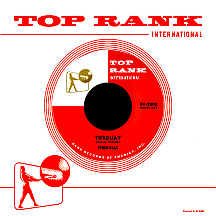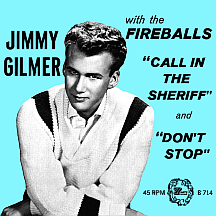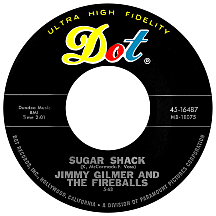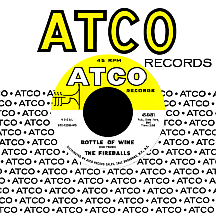THE FIREBALLS
Clovis, N.M. wasn't exactly the center of the music world...although a certain segment of rock and roll devotees familiar with the sounds emanating from Norman Petty's recording studio in the center of the desert town during the late '50s and early '60s will tell you it topped anything coming out of N.Y., L.A. or N.O. As a teenager, Norman did some amateur audio taping in his dad's gas station; in 1948 he married pianist-singer Violet Ann Brady (whose professional name became Vi Petty) and a few years later, with the addition of guitarist Jack Vaughn, formed The Norman Petty Trio. An organ-soaked version of Duke Ellington's 1931 classic "Mood Indigo," with Vi's lead vocal, was a hit on RCA's "X" label in the fall of 1954, after which the slightly richer Norm returned to Clovis's 7th Street gas pumps and set up the Norman Petty Recording Studio (he later built an office next door for his Nor Va Jak Music operation, named for the trio's members). Within a few years, hits by essential rock acts like Buddy Holly's Crickets and Buddy Knox and The Rhythm Orchids were giving any aliens still hovering over New Mexico in space ships a preview of some excellent songs earthbound humans would soon be turning into million sellers.
Unlike Texans Holly and Knox, the act that would go on to score the biggest of all Petty-produced hits also hailed from his home state, in the small town of Raton, New Mexico, northbound near the Colorado border. Guitarists George Tomsco and Chuck Tharp started a band at Raton High with bassist Stan Lark, drummer Eric Budd and another guitarist, Danny Trammell. At a Christmas '57 talent show, the unnamed group played and Chuck sang a current hit, "Great Balls of Fire" (the second piano-pounding smash in a row for Jerry Lee Lewis) and it went over so well they named themselves The Fireballs. Well aware of Petty's studio and its history with the hitmaking Crickets, they scheduled a late summer recording session, briefly crossing paths with Holly and company, who were laying down some tracks at the same time. As with the two Buddys, Petty signed the Fireballs to a management contract that allowed him to license their product to various labels; his connections in the record industry gave the still-teenage band an advantage they wouldn't have had on their own.
"Fireball," an atmospheric, predictably-titled instrumental, was recorded in the summer of 1958 and released on Kapp in early '59; the flip side, "I Don't Know," featured a vocal by Tharp. The Fireballs played on numerous recordings by other (mostly unsuccessful) singers, giving the quintet steady work while anticipating greater things to come. An instrumental called "Curious" was licensed to Top Rank International Records (a U.S. subsidiary of Britain's Rank Organsation film company); someone at the label changed the title to "Torquay," after a city on the southern coast of England, and the single landed in the U.S. top 40 in October '59. "Bulldog" made a more rapid climb and spent a few weeks in the top 30 in February 1960.
Another vocal single, "Long, Long Ponytail," appeared on Jaro International (also part of the U.K.'s Rank conglomerate) as Chuck Tharp and the Fireballs in a move similar to other Petty acts (Holly's separate group and solo platters as well as individual Rhythm Orchids releases by Knox and band member Jimmy Bowen). The next single, "Foot-Patter," missed the charts (though its flip, "Kissin'," received a lot of airplay in Portland, Oregon as a theme for top 40 station KISN) and "Vaquero (Cowboy)" made a minor showing. The Fireballs were cranking out some of the best rock instrumentals of the period, placing them on par with hitmaking contemporaries from various points on the map: Link Wray of the Virginia-D.C. area, Toledo, Ohio's Johnny and the Hurricanes, Philadelphia's Virtues, New Jersey's Viscounts, Tacoma, Washington's Wailers and two from Los Angeles, The Champs and drum-thumper Sandy Nelson...all chasing top dog Duane Eddy of Phoenix and his impressive string of "twangy" guitar hits. One edge the Fireballs had on the others were Chuck's vocal sides...but would they ever score a hit with one?
The first change in the lineup came as a result of Danny Trammell's health; he developed asthma and decided to quit the group, which continued as a quartet. Chuck Tharp's vocal discs hadn't connected and in the summer of '61 he joined the Army, leaving an open slot filled by one of Petty's artists, Jimmy Gilmer, a 21-year-old native of Chicago raised in nearby Amarillo, Texas and the former leader of a high school band familiar with Clovis, having landed a few gigs there. At that point Jimmy had been recording solo at Norman's studio for two years; his first single, "Look Alive!," appeared on Decca in 1959 at about the same time as the Fireballs' "Torquay." A couple of unsuccessful efforts for Warwick Records (Holly's "True Love Ways" and a song written by George Tomsco, "Do You Think") made a merge with the Fireballs seem logical.
The band was signed to Warwick and notched a top 40 summer hit with "Quite a Party." Gilmer's debut as frontman, "Call in the Sheriff," was scheduled for release on 7 Arts (which distributed Warwick) but was pulled from release even though a picture sleeve had been printed in advance. Continuing his separate-release strategy, Petty put out vocal 45s under Jimmy Gilmer and the Fireballs or Gilmer alone, while instrumentals remained under the Fireballs banner. You could've heard a pin drop in Clovis during 1962, at least in comparison to the previous three years. Eric Budd joined the Army and was replaced by Doug Roberts. Petty worked out a deal with Randy Wood of Dot Records late in the year; expectations were low but the label had a lot of clout. A solo Gilmer single, J. Leslie McFarland's "Won't Be Long" (a mid-chart hit for Aretha Franklin in 1961) was pressed on the Dot-distributed Hamilton label. Then some guy named Keith McCormack unwittingly ignited the next phase.
McCormack's band, The String-A-Longs of Plainview, Texas, had been Nor Va Jak regulars for a few years, grabbing the glory from the Fireballs for a moment in the early months of '61 with their top ten hit "Wheels," a song first offered to, and rejected by, Tomsco's band. Like Tharp and Gilmer, McCormack dreamed of singing stardom but would have to settle for writing a massive hit song. "Sugar Shack" was composed with the early '60s folk movement in mind, talkin' 'bout 'expresso coffee' (with an "x") and '...a cute little girlie she's-a...a-workin' there...a-black leotards and her feet are bare,' a simple story with large scale appeal (Keith's more fashion-aware aunt, Faye Voss, supplied the word "leotards" and he split the writers' royalites with her...lucky lady!). Petty added a melody played on a vintage Hammond Solovox and dubbed it onto the track; the synthesized "carnival" sound didn't set well with the Fireballs, who figured the record would stiff. It entered the charts in September 1963, hit number one three weeks later...and wound up being the top-selling single of the entire year!
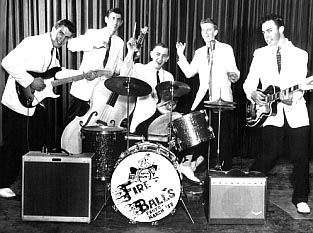
Demand for personal appearances packed the touring calendar; Stan, Doug, Jim and George hit the road, leaving the Solovox back in Clovis (Tomsco came up with an electric axe-picking replacement riff, giving the song a considerably different live sound). "Torquay Two" was a grittier version of the group's first hit and an odd choice for an instrumental Fireballs follow-up, then in February '64 "Daisy Petal Pickin'," another McCormack tune imitating the "Sugar Shack" arrangement, took the old 'She loves me, she loves me not' schtick to number 15. "Ain't Gonna Tell Anybody" excised the Solovox while sticking to the same basic arrangement and had a less noticeable chart run. Instrumentals alternated with vocals for the next few years, the most notable a 1964 solo Gilmer remake of Buddy Holly's "Look At Me" and a 1966 garage-rocker, "What I Am," written by Tomsco and sung by the whole group (a cover by Tommy James and the Shondells turned up a few months later and made the top 40).
Reacting, perhaps, to the coffee house theme of "Sugar Shack," Jimmy Gilmer became a folk music fan and often visited Greenwich Village clubs on trips to New York. One performer he took a liking to was Tom Paxton, a small-town-Oklahoman with a crowd-pleasing drinking song, "Bottle of Wine." Dot prez Randy Wood wasn't wild about its message or chances of getting radio airplay, so Norm, still in control of the band's contract, made a deal with Atlantic Records. The single, on Atco, with edgier vocals by Gilmer ('...when ya gonna let me get sober?') and a rocking party feel missing from Paxton's intentionally gloomy original, went top ten in March 1968. The band had a nice run of chart singles through the following spring: "Goin' Away," "Come On, React!" and a remake of The Kingsmen's "Jolly Green Giant" flip, "Long Green."
Gilmer and Roberts left the group late in '69, leaving founder George Tomsco and drummer Doug Roberts to carry on as a live act. Keith McCormack joined at some point as lead singer, finally getting a chance to perform his chart-topping hit "Sugar Shack." In 1971 the band released two singles under a new group name, Colorado (remember where Raton is located!), including an Elton John-Bernie Taupin song, "Country Comfort." Jimmy Gilmer dabbled in music production for awhile before getting into song publishing...where the real money is! Chuck Tharp rejoined Tomsco in a throwback edition of The Fireballs, keeping the Clovis sound accessible to audiences in the '80s and '90s.
NOTABLE SINGLES:
- Fireball - 1959
- Look Alive! - 1959
by Jimmy Gilmer - Torquay - 1959
- Bulldog - 1960
- Long, Long Ponytail - 1960
as Chuck Tharp and the Fireballs - Foot-Patter - 1960
- True Love Ways - 1960
by Jimmy Gilmer - Vaquero (Cowboy) - 1960
- Do You Think - 1960
by Jimmy Gilmer - Rik-A-Tik - 1961
- Quite a Party - 1961
- Won't Be Long - 1963
by Jimmy Gilmer - Sugar Shack - 1963
as Jimmy Gilmer and the Fireballs - Torquay Two - 1963
- Daisy Petal Pickin' - 1964
as Jimmy Gilmer and the Fireballs - Ain't Gonna Tell Anybody - 1964
as Jimmy Gilmer and the Fireballs - Daytona Drag - 1964
- Look At Me - 1964
by Jimmy Gilmer - What Kinda Love? - 1964
by Jimmy Gilmer - Dumbo - 1964
- She Belongs to Me - 1965
as Jimmy Gilmer and the Fireballs - What I Am - 1966
- Bottle of Wine - 1968
- Goin' Away - 1968
- 3 Minutes' Time - 1968
- Come On, React! - 1968
- Long Green - 1969
- Sugar in the Woods - 1969
by Jimmy Gilmer - Country Comfort - 1971
as Colorado


